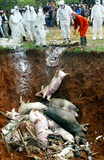The Indonesian government is waging a campaign to exterminate pigs alleged to be infected with the deadly bird flu virus. The Taipei Times published this account:
 When government workers in white anti-contamination suits descended on Ceng Kim’s farm to slaughter his pigs, claiming they were infected with the bird flu virus that killed three people nearby, he hid inside his house. When government workers in white anti-contamination suits descended on Ceng Kim’s farm to slaughter his pigs, claiming they were infected with the bird flu virus that killed three people nearby, he hid inside his house.He couldn’t bear to watch, but the rest of Indonesia saw the dramatic images on television that night: Squealing pigs electrocuted one by one and tossed into a fire. | |
| “My pigs didn’t kill anyone,” said Kim. “But if the government says they’re sick, what can I do?” |
| “There is some historical data from China and Vietnam as well as Indonesia where this particular virus has been identified in pigs,” he said. “But we don’t have evidence that the pigs were diseased or were actually infected by the virus.” | |
| Meanwhile, the country’s top veterinarian came out against the Agriculture Ministry policy, saying it appeared to be “political.” Indonesia is the world’s most populous Islamic country and many Muslims consider pigs to be unclean. | |
| “There is no proof that any humans have been infected by pigs,” said Dr. Trisatya Putri Naipospos, adding, “We have to control the disease at the source, and the source is birds and chickens infected by the H5N1 virus, not pigs.” |
From the evidence available, it seems that the positive readings for the virus in the pigs may be due to the droppings from infected birds, which inhabit the same farmyards as the pigs.
Epidemiologists now believe that the 1918 influenza epidemic originated in domestic fowl and then spread to farmyard mammals. The disease jumped to humans via the Allied soldiers who were in close contact with farm animals on the Western Front, living in cramped conditions that were ideal for the spread of the disease.
Given the high stakes in the avian flu outbreak, some people simply refuse to take any chances:
| In May, an Indonesian scientist said he found H5N1 in blood samples taken from pigs, which are genetically similar to people and often carry the human influenza virus, raising concerns that the animals could help fuel a devastating flu outbreak. | |
| Experts worry that pigs infected with both bird flu and its human equivalent could act as a “mixing bowl,” resulting in a more dangerous, mutant virus that might spread to people more easily — and then from person to person. |

No comments:
Post a Comment
All comments are subject to pre-approval by blog admins.
Gates of Vienna's rules about comments require that they be civil, temperate, on-topic, and show decorum. For more information, click here.
Users are asked to limit each comment to about 500 words. If you need to say more, leave a link to your own blog.
Also: long or off-topic comments may be posted on news feed threads.
To add a link in a comment, use this format:
<a href="http://mywebsite.com">My Title</a>
Please do not paste long URLs!
Note: Only a member of this blog may post a comment.